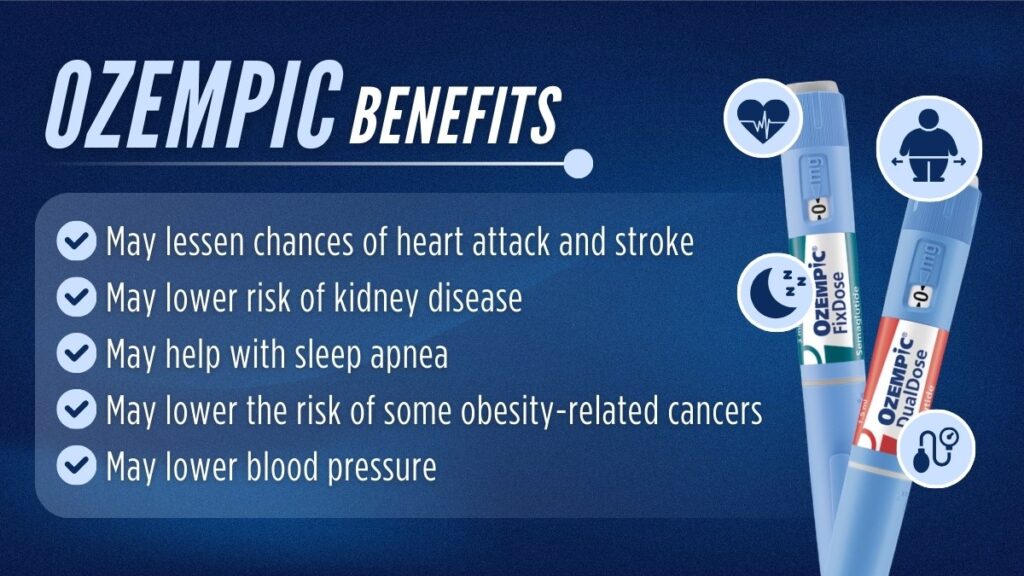
According to the National Institute of Health’s overweight and obesity statistics, nearly 1 in 3 men and 1 in every 4 women in the U.S. are considered overweight. Additionally, more than 2 in every 5 adults are currently categorized as obese.
This is happening despite a recent trend over the last decade of Americans trying to exercise more and eat healthier. This then begs the question, are Americans really trying to develop healthier lifestyles, or are folks instead making an effort for a time and then giving up? And why? Is it because the hoped-for results aren’t happening?
As many struggle with weight loss despite working hard at it, a new weight-reducing drug has arisen that gives hope to those who have tried everything else to no avail.
It’s called Ozempic, and I will tell you all about it.
What Is Ozempic?
Known generically as semaglutide, Ozempic was designed by Novo Nordisk pharmaceutical researchers as a medication for type 2 diabetes. The FDA approved it in 2017.
How Does Ozempic Work for Weight Loss?
Ozempic works by imitating a naturally occurring hormone in your body known as glucagon-like peptide-1 (GLP-1) with a synthetic substitute known as semaglutide. Both the hormone and its substitute work by sending a signal to your brain that you’ve eaten enough and your stomach is full.
GLP-1/semaglutide also slows down how fast your stomach empties, maintaining a sense of feeling full to manage blood sugar levels in people with type 2 diabetes.
In short, Ozempic weight loss works by making you feel like your stomach is full, so you won’t want to eat and stuff in more calories.
Is Ozempic Effective for Weight Loss?
While the answer to “Is Ozempic approved for weight loss?” is not in the affirmative, Ozempic weight loss is nevertheless a very real phenomenon when used for what it was intended: the treatment of type 2 diabetes in obese and non-obese individuals.
How Much Weight Can You Lose With Ozempic?
According to a statement released by the Columbia University Hospital Center for Metabolic and Weight Loss Surgery, Ozempic and other drugs result in weight loss success of up to 15-20% over 1 year [1].
Even the lower third of patients experience about a 10% loss of total body weight over the course of 1 year.
Do You Need to Diet and Exercise While on Ozempic?
Yes. Ozempic dosing for weight loss without diet and exercise will likely not produce the most effective results, especially at the lower doses prescribed at the beginning of treatment.
Even if your Ozempic weight loss dosage is raised over time, it is still recommended that you supplement your medication with a healthy diet and regular exercise. Weight loss programs may be beneficial for optimal results.
5 Key Ozempic Benefits
What are the actual benefits of Ozempic for weight loss? Let’s discuss some of them below.

1. May Lessen the Chances of Heart Attack and Stroke
According to an edition of the Mayo Clinic Press, studies have shown that in diabetic adults who exhibit symptoms of cardiovascular and/or heart disease, semaglutide can reduce the risk of future events or death by up to 26%. An additional study with non-diabetics reduced cardiovascular incidents by 20% [2].
Studies also show that semaglutide can decrease heart failure-related symptoms such as shortness of breath and tiredness.
2. May Lower the Risk of Kidney Disease
During the FLOW trial conducted by Novo Nordisk, it was found that people who have type 2 diabetes and kidney disease who took Ozempic saw a reduction of kidney disease and death by 24% [3].
3. May Help Treat Sleep Apnea
Ozempic and other similar weight loss drugs may be able to help with sleep apnea, a condition that causes a person to stop breathing during sleep [4]. Sleep apnea can be a common symptom of overweight diabetics, and losing weight can reduce the amount of fat in the neck and help open up airways.
4. May Lower the Risk of Some Obesity-Related Cancers
A 2023 study published in JAMA Oncology in 2024 found that GLP-1 drugs (including Ozempic) may be able to reduce the rate of colon cancer among both obese and non-obese individuals [5].
Another study presented at the American Society of Clinical Oncologists showed that GLP drugs dramatically reduce the rate of progression of 13 obesity-related cancers [6].
5. May Lower Blood Pressure
Studies have shown that Ozempic may lower systolic blood pressure by as much as 5mmHG in overweight but not diabetic individuals [7].
Potential Side Effects and Risks of Taking Ozempic for Weight Loss
Individuals with and without diabetes who experience Ozempic weight loss is a documented fact. Yet, besides its obvious benefits, there are some Ozempic weight loss side effects that people need to be aware of.
According to the Drugs.com website, the following are some of the common side effects associated with Ozempic.
- Approximately 3% to 7% of Ozempic users experience mild to moderate constipation, though daily supplements may help with this.
- Nausea is the most common side effect, with about 15% to 20% of users experiencing nausea when using Ozempic.
- Abdominal pain is another common side effect among 6% to 7% of Ozempic users.
- Diarrhea is a common symptom affecting 8% of users.
- Hypoglycemia can occur among people with diabetes who use both Ozempic and insulin to manage blood glucose levels.
- Dizziness was a rare side effect among Ozempic users, though it can occur when Ozempic is used with insulin, which can sometimes result in low blood sugar.
- Fatigue may occur, but it is a relatively rare side effect that usually disappears as one becomes more used to the medication.
- Gallstones are included on the Ozempic label as a potential side effect, and studies show that 90% of patients who develop these stones require surgery to remove them.
- Allergic reactions are one of Ozempic’s more serious side effects. You should seek medical care immediately if you experience allergic reactions like hives, itching, or swelling of the lips, face, tongue, or throat.
What Happens When You Stop Taking Ozempic?
Ozempic weight loss is not a permanent fix. When you stop taking Ozempic, here are some of the results you can expect to occur almost immediately:
- Within a week, your normal appetite will likely return.
- You will also gain back much of the weight you lost due to increased appetite if you don’t keep exercising and eating a low-calorie and high-protein diet.
- Your blood sugar levels may become elevated, bringing back symptoms of type 2 diabetes if you suffer from it.
- You may also experience mood changes as you regain weight and become depressed as a result.
Ozempic vs Wegovy
Brand name Ozempic and Wegovy both contain semaglutide, which mimics the hormone GLP-1. This hormone works just like other appetite suppressants that block or increase certain hormones and neurotransmitters that affect your hunger pangs. However, the FDA has approved each of these medications for different uses.
Ozempic was approved in 2017 to treat type 2 diabetes and reduce cardiovascular risks, while Wegovy was approved in 2021 for weight loss and cardiovascular risk reduction.
Both are manufactured by the pharmaceutical company Novo Nordisk. Each requires a prescription and is administered with weekly injections. Wegovy’s maximum dose of 2.4 mg is higher, and it comes in a disposable single-use injection pen. The maximum dose of Ozempic for weight loss is 1 mg, and its injection pen contains four individual doses.
As far as producing weight loss results, Wegovy has scored higher in clinical trials, though this is generally attributed to Wegovy’s higher weekly dosage.
Is Off-Brand Ozempic Safe?
According to an official U.S. FDA website article, the agency warns that counterfeit versions of Ozempic available in the United States are potentially dangerous. They are illegal, could contain the wrong ingredients, as well as too much or too little of the correct ingredients, and potentially harmful ingredients.
Expert Insights
The buzz around Ozempic for weight loss is hard to ignore, but what do the experts say? A piece by Lauren Ball, Professor of Community Health and Wellbeing at The University of Queensland, and Emily Burch, Lecturer at Southern Cross University, sheds light on both the potential and the pitfalls [8].
One study they highlighted in the article offers a compelling glimpse into Ozempic’s power. Participants taking 2.4 mg of semaglutide (the active ingredient in Ozempic) weekly, combined with lifestyle changes, experienced a 14.9% reduction in body weight, compared to a mere 2.4% in the placebo group [9].
However, nausea and diarrhea emerged as the most common side effects in the study. Thankfully, these are often described as temporary and manageable, fading as the body adjusts.
Ultimately, Ball and Burch offer a crucial takeaway: Ozempic is a tool that should be wielded responsibly, which means working closely with your healthcare provider. They bring us back to the bigger picture, reminding us that weight is just one facet of overall health. A holistic approach is paramount, prioritizing a balanced diet, regular physical activity, and adequate rest.
FAQs for Ozempic Weight Loss
These are some examples of the types of questions that customers are asking about how to get Ozempic for weight loss and other health benefits.
Do you gain weight back after stopping Ozempic?
Yes, most people regain some or all of the weight lost after stopping Ozempic. The medication helps reduce your hunger and make you feel full. But when you stop, those feelings can return, leading to increased eating and weight gain. Maintaining weight loss after stopping Ozempic requires ongoing lifestyle modifications, including diet and exercise.
How long can you stay on Ozempic for weight loss?
It can range from months to potentially longer-term management as long as you tolerate the medication well and it continues to be beneficial for your weight management goals. The duration isn’t strictly defined by a specific time limit.
Is Weight Loss With Ozempic Permanent?
No. If Ozempic is stopped without maintaining healthy eating habits and regular physical activity, it’s possible to regain the lost weight.
What Is a Cheaper Alternative To Ozempic for Weight Loss?
Compounded semaglutide obtained through telehealth platforms is your best bet. Semgaltide is the active ingredient in Ozempic but its compounded version lacks the FDA’s rigorous approval and oversight.
How Much Weight Can You Lose in a Month With Ozempic?
Ozempic is a prescription drug designed for the long-term treatment of type 2 diabetes, so estimating how much weight you can lose after taking it for a month can be tricky. Research conducted among obese diabetics indicates that you can lose an average of 5 pounds a month on Ozempic.
How Quickly Do You Lose Weight on Ozempic?
Ozempic is not designed to be a quick fix. While those with binge eating disorder may notice a decrease in appetite in as little as a week, the most noticeable results with Ozempic weight loss semaglutide usually occur within 30 to 68 weeks.
Does Ozempic Help With Anxiety?
There is no evidence showing that Ozempic has any direct effect on your anxiety levels. However, since mood changes are a side effect of Ozempic, researchers feel it has more to do with the change in your caloric intake rather than a direct impact on your mental health.
What Is the Downside of Ozempic?
Some examples of Ozempic weight loss side effects are gastrointestinal discomfort like stomach pain, nausea, diarrhea, constipation, and flatulence. Ozempic can also cause more serious problems like pancreatitis, kidney problems, thyroid cancer, and other allergic reactions.
How Long Does It Take to Lose 20 Pounds on Ozempic?
Several factors can affect Ozempic weight loss, such as the size of your dosage, diet, and exercise. Ozempic weight loss results can also be affected if you are taking other medications. That said, the average monthly weight loss while on Ozempic is approximately 5 pounds, so if you maintain that average, you could lose 20 pounds in about 4 months.
How to Get Prescribed Ozempic for Weight Loss?
You’ll need to schedule an appointment with your doctor or a healthcare provider specializing in weight management. They will assess whether you meet the criteria for Wegovy or if prescribing Ozempic off-label is appropriate and safe for you. These typically involve having a body mass index (BMI) that categorizes you as overweight or obese and potentially having weight-related health issues.
Final Thoughts on Ozempic Weight Loss
Initially created to help those with type 2 diabetes manage their condition, Ozempic can also help people lose weight. Yet, since the FDA has not approved it for weight loss, doctors are divided on whether or not it should be prescribed as an off-label medication for weight loss.
You should also remember that Ozempic weight loss is not a magic formula. It will work far better if you supplement it with a healthy diet and engage in regular exercise.
If your weight continues to be an issue, even if you are eating right and exercising, you should talk with your doctor to see if taking Ozempic for weight loss is the right move for you.
 11 Niche Experts
11 Niche Experts
 100+ Product Reviews
100+ Product Reviews
 50+ Tested Products
50+ Tested Products
At BestDaily, our mission is simple: to help you make confident, informed decisions about the products that impact your daily life. Whether you're searching for wellness essentials or lifestyle upgrades, we combine hands-on testing with expert analysis to highlight what truly works.

